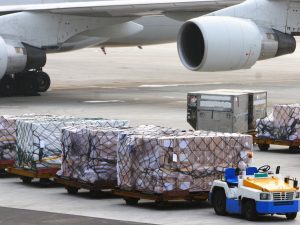Keku Bomi Gazder, MD and CEO, Aviapro Logistic Services says, “Air cargo should indeed be considered a priority in Free Trade Agreements (FTAs). Prioritising air cargo in FTAs can have a significant positive impact on cross-border trade for several reasons. Firstly, air cargo offers unmatched speed and efficiency in transporting goods, reducing lead times, and allowing for quicker delivery of products. This efficiency can lead to a boost in trade activities. It enhances accessibility to a wider range of markets, making it easier for businesses to engage in international trade and reach consumers globally. Secondly, Air cargo is particularly crucial for perishable and high-value goods that require swift transportation to maintain quality and value. Prioritising air cargo can open opportunities in sectors such as agriculture and electronics. Including provisions related to air cargo in FTAs can help reduce trade barriers, such as customs delays and bureaucratic procedures, further facilitating trade. Therefore Yes, prioritising air cargo in FTAs can streamline cross-border trade, boost economic activities, and help nations fully harness the benefits of international commerce. Prioritising air cargo in FTAs can offer several advantages to India’s EXIM (Export-Import) trade, investments, and participation in global markets. India’s exports, especially in sectors like pharmaceuticals, textiles, and electronics, can benefit from quicker and more reliable transportation through air cargo. This can open new markets and increase export volumes. A robust air cargo infrastructure can make India more attractive to foreign investors looking to establish supply chains or manufacturing operations in the country. It enhances India’s position as a favourable investment destination. Participation in global value chains becomes more accessible when there’s efficient air cargo connectivity. Indian businesses can become integral parts of international production …
Read More »‘Trade agreements bring in FDIs for building new facilities & expanding existing capacity’
Balasubramanian, Founder & CEO, Air Cargo Consultancy International Services (ACCIS) says, “According to IATA, 1% increase in air cargo connectivity is associated with a 6.3% increase in total exports and imports. We need not go back into history but simply recall the recent critical role played by air cargo during the Covid. The value of air cargo in saving lives and livelihoods was felt globally and recognized accordingly. Given that air cargo moves more than one third of the global trade by value, a recent study has established a direct relationship between air cargo connectivity and increased participation in global trade. It is obvious that the speed of air cargo plays a critical role in a business’s quest for quicker and faster access to competitive markets and to establish themselves as a long-term player. The direct correlation between air cargo and boost to EXIM trade by 1:6.3 is well supported by the results of the study quoted earlier. Access to more markets and expansion of global footprint is enabled by governments entering into agreements with other countries – be it in the traditional sector such as textiles, garments, leather or gems and jewelry or in the new age technological products such as electronics involving semi-conductors, microchips, other hardware equipment/accessories and the list is long. Bilateral and multilateral trade agreements bring in foreign direct investment (FDI) leading to both setting up of new facilities and enhancement of existing capacity. One of the key objectives of such enhancement of production capability is to boost export trade to narrow the gap of balance of trade. These specific steps play a key role in increased participation of India in the global arena and in …
Read More »‘FTAs reduce trade barriers & remove export regulations & facilitate EXIM traffic’
C K Govil, President ACAAI shares, “India has been promoting ease of doing business, and FTAs are a testimony to that effort. India has been promoting FTAs with bilateral and regional partners to boost export-oriented domestic manufacturing. Last year, India carried 2.2 million tonnes of air cargo, 70% of which was to international sectors. This is one-tenth the size of the American air cargo market and one-fifth of China’s. This figure can increase if air cargo is prioritized under the FTAs. India currently has 13 FTAs operational and 8 under negotiation. These are bound to uplift Indian trade on the global platform. In the past five years, India’s merchandise exports have grown by 20.75% to countries with which it has signed FTAs. It will go up if FTAs focus on air cargo. While the National Logistics Policy and Gati Shakti gave the recognition to air cargo, now it needs the boost that prioritization in FTAs can provide. FTAs reduce trade barriers and remove export regulations, thus facilitating EXIM traffic. India’s exports to ASEAN Countries have increased from US$25.13 billion in 2016 to US$31.49 billion in 2021. Our exports to SAFTA nations have grown from $18.60 billion in 2016 to $22.08 billion in 2021, and to South Korea from $3.52 billion in 2016 to $4.68 billion in 2021. Our FTAs have brought in a cumulative investment of $89.54 billion in just five years. And that is just the beginning. We have seen a similar trend whenever an FTA has been signed, and the number of Indian trade partners is increasing. This will attract further foreign investments and participation in our country. Air cargo cannot be left behind amid all this action.”
Read More »‘Free exchange of export or import of cargo by air between two nations will boost cross border trade’
Sunil Kohli, MD, Rahat Cargo says, “In the current global context, a free-trade policy leading to a Free Trade Agreement (FTA) between two nations may simply be termed as the absence of any trade barrier between them. However, the respective governments having entered into such FTAs do not necessarily abandon all control of imports and exports or eliminate all protectionist policies which may also have exceptions in regard to import of specific drugs not approved by its regulators, pharmaceuticals or processed foods, fruits & vegetables, not in conformity with their approved standards. Therefore, in light of the availability of a free exchange of goods between two countries, it can be undoubtedly surmised that air cargo can play a vital role in transporting assorted commodities between them at an accelerated pace. And hence formulating a policy prioritising the air cargo on FTAs can yield an extremely positive outcome which may facilitate the countries to experience faster & unhindered growth while better meeting the needs of their consumers. Further, a free exchange of export/import of cargo by air between two nations would definitely enhance quantum of such activities thereby leading to a boost in the cross border trade with mutual commercial advantages.”
Read More »Lufthansa Cargo, Maersk partner to use SAF
Lufthansa Cargo and Maersk have signed an agreement to promote the decarbonization of airfreight with SAF (Sustainable Aviation Fuel). It will use 400 metric tonnes of SAF on behalf of Maersk in the remainder of 2024. The expected cut down of CO2 emissions corresponds to at least 1,200 metric tonnes. “SAF is a decisive technological key to more sustainable flying and essential for the energy transition in aviation. With Maersk we are jointly making a valuable contribution with the new agreement. At the same time, more sustainable flying also requires major efforts for a modern fleet and increased efficiency in flight operations. It is only through this interplay that change can be achieved sustainably,” Ashwin Bhat, CEO, Lufthansa Cargo, said.
Read More »Pune Airport records 6.32% growth in domestic air cargo in six months
Pune’s domestic freight has increased to 6.32% increase in the last six months. According to reports from the airport authorities, a total of 19,662.5 metric tons of domestic cargo were processed between April and September 2024-25. This surge in cargo activity highlights an expanding role for Pune’s businesses and entrepreneurs in the region’s growing logistics network, says official reports. The rise in domestic air freight indicates not only an increase in trade and commerce but also a positive sign of Pune’s integration into the broader logistics infrastructure of the country. This growth in cargo traffic is especially notable considering that, just a year ago, only domestic freight services were operating at the airport, with international cargo services suspended. However, with the resumption of international services, the airport has witnessed a substantial uptick in the movement of goods, the reports add. The domestic cargo at Pune Airport includes a wide variety of goods ranging from fresh vegetables and fruits to pharmaceuticals, small consumer goods, and industrial products. The airport’s handling of these goods is carried out using advanced systems that ensure swift and efficient processing. A dedicated department is in place to handle the logistics, and the goods are subjected to rigorous checks before being cleared for transport.
Read More »IndiAirport Expo 2024 focused on transforming air cargo & airports
PHD Chamber of Commerce & Industries (PHDCCI), along with Radeecal communications & IFW Heidelberg Expo GmbH & GATE, Germany is organising the 3rd Edition of International Expo & Summit – IndiAirport Expo 2024 from November 26-28, 2024 in New Delhi. Based on the success of the previous 2 editions, IndiAirport Expo 2024 –an International Exhibition & Conclave is focusing on airports and all its ancillary products & services, MRO industry & aviation technology, infrastructure, advancement, facilities, services & ground handling equipment and other relevant industries. Piyush Srivastava, Senior Economic Adviser, Ministry of Civil Aviation said, “Cargo business in India is actually growing on the belly of the passenger aircraft, largely. 85% of the cargo that flies off and into the country is the belly of the aircraft.The belly capacity will obviously increase as we are having a large number of aircraft on board, so it is going to increase exponentially. What would be required is, at the back end, we also upgrade the technology. The technology will have different dimensions. One is, of course, the technology, the mechanization is, of course, the technology, the mechanization at the airport, the terminals themselves. The other would be the stakeholders, who actually get the cargo and bring it to the airport.”
Read More »Kale joins Cargo iQ to boost digitalisation
Kale Logistics Solutions (Kale) has joined Cargo iQ as a new strategic associate partner, specialising in digitalisation and supporting digital reporting capabilities. The Partnership will further Cargo iQ’s ambitions to ensure air cargo quality standards are met and continuously improved through data reporting and collaboration. As a Strategic Associate member, Kale will be offering insight to help members optimise their digital capabilities and improve stakeholders’ communication, in line with Cargo iQ quality standards. “As facilitators of collaboration and drivers of digitilisation for the global air cargo industry, it is great to work with Kale as a strategic partner,” said Marie Seco-Köppen, Executive Director, Cargo iQ. “Their proven expertise in helping logistics export/import stakeholders achieve better coordination, visibility, resource optimisation, and rapid information exchange, will enable more industry stakeholders to improve process quality across their operations.” “We are proud to work with Cargo iQ, to help improve the air cargo industry through collaboration and bring more digital solutions to the community,” said Amar More, CEO, Kale Logistics Solutions. “Our team is excited to work with Cargo iQ especially with our cargo community systems and expertise in digital harmonisation that support the quality standards Cargo iQ continuously improving.”
Read More »‘We will see more SMB clusters emerging from tier 2 & 3 cities, robust digital connectivity and infra must’
Grégory Goba-Blé, Head of UPS, India and Director of MOVIN Express shares, “We are expecting see more SMB clusters emerge from tier 2 & 3 cities. They will need robust digital connectivity and infrastructure to connect them to global supply chains. We’re looking at all opportunities to drive higher productivity and we will continue to lean into our customer-first, people-led, innovation-driven strategy. It’s about the combined power of our offerings to make logistics simple, accessible, and harmonized for customers. We recently opened a specialised healthcare-focused cross-docking facility in Hyderabad. It’s pharma grade with freight forwarding capabilities and is equipped with advanced temperature control capabilities to improve efficiency.”
Read More »‘FTAs with nations like Japan, Korea, Singapore, & CEPA with UAE, will drive growth’
Akash Agrawal, Vice President – Freight Forwarding – Middle East, North Africa and Subcontinent, DP World says, “With India implementing FTAs with nations like Japan, Korea, Singapore, and CEPA with the UAE, trade strategies are driving economic growth. As trade thrives, efficient freight forwarding becomes essential for success. DP World with its global network helps businesses navigate complex supply chains, enhancing operational efficiency and enabling rapid scaling. Our approach supports both emerging businesses and established corporates, ensuring they thrive in a competitive global market. Looking ahead, we remain committed to progress, creating value, and leading the way in the evolving supply chain landscape.”
Read More » Cargo Breaking News
Cargo Breaking News









